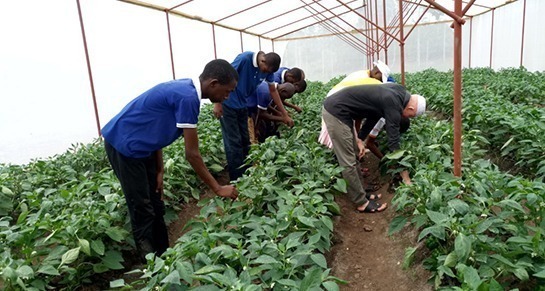Recent Posts
Get in touch!
Fusce varius, dolor tempor interdum tristiquei bibendum service life.
Fusce varius, dolor tempor interdum tristiquei bibendum service life.

The Partnership for the Development of Agriculture in Southern Tanzania (SAGCOT) has the responsibility to transform the agricultural sector in the Southern Region of Tanzania, by stimulating integrated investment and sustainable conservation of the environment. Achieving this goal requires plans and investments that take care of Tanzania's natural assets, ecosystems and biodiversity; to develop profitable agricultural production systems and operations of value chains that focus on sustainable conservation of the environment and are responsible for society, empowering society on methods of better use of existing natural resources and taking precautions against climate change; creating business opportunities for small farmers and communities that will allow sustainable wealth production; and which complies with the laws and standards set from the social, national and international levels.
The SAGCOT Sustainable and Integrated/Participatory Agriculture Group (GRG) is a multi-stakeholder platform that acts as an informal advisory body to the SAGCOT Institute at the national and regional levels. The GRG brings together a group of representatives of stakeholders from the government (Office of the Vice President, Ministries of Agriculture, Natural Resources and Tourism, Education, Construction, Land and Housing Development), the private sector (including farmers and companies), donor communities (RNE , UNEP), and civil organizations (WWF, CARE International, TNC, IUCN and AWF), as well as private scientific advisors. The SAGCOT GRG was established to assist the SAGCOT Institute in coordinating and monitoring environmental issues in programs within the SAGCOT Partnership. In terms of governance structure, the GRG Group is led by co-chairs who are the Office of the Vice President (representing the Government of Tanzania) and the Chief Executive Officers Discussion Table (CEOrt), representing the private sector. At the regional level, this Group is managed by the respective Regional Administrative Secretary as well as representatives from private sector companies within the region to ensure the agenda of sustainability and challenge in all SAGCOT regional activities. Investment partners of the Public and Private Sectors in the region are not only united according to the law but to work in accordance with existing laws and also to unite practically to encourage the participation of stakeholders in a manner that is friendly to the environment and also the growth of sustainable agriculture for the community, doing work closely with the SAGCOT Institute. This effort is implemented with an important tool called the Inclusive and Sustainable Growth Guide (Inclusive Green Growth or IGG tool) which SAGCOT uses to help small to large companies understand what inclusive and sustainable growth means and how to incorporate it into their management work.
The primary objective of the GRG Group is to provide guidance, advice and recommendations to the SAGCOT Institute and its partners on environmental and social issues. This guide includes the development of opportunities for sustainable growth and sustainable agriculture in response to climate change, as well as the identification and joint management of risks and losses resulting from environmental degradation. Also to help the SAGCOT Institute to develop and increase awareness on inclusive opportunities for sustainable growth.
The advice given by the GRG Group does not impose conditions on the shareholder but is guided by the Code of Dealing with Hazardous Matters, the Code of Charging the Damager/Polluter of the Environment and the United Nations Standard Rules governing the Environment. Managing the sustainable and wise use of existing natural resources and encouraging innovation for sustainable growth. GRG supports the implementation of the Environmental Management Law signed in 2004 on sustainable long-term plans (10-30 years) like SAGCOT.
Green Reference Group membership reflects the Public-Private Partnership that is SAGCOT’s hallmark. It also reflects the different interests and technical skills required to manage the diversity and complexity of operations. The structure of the Rejea Ukijani Group aims to facilitate the presence and participation of key stakeholder groups – the Government of Tanzania, the donor community, the private sector and civil society organizations – while achieving the goal and increasing efficiency. All members are registered partners in the SAGCOT Partnership, excluding the professionals contracted by the Rejea Ukijani Group to provide specific services or their expertise.
The GRG Group has planned to ensure it can deliver results on time, while responding to the needs presented by the SAGCOT Institute. GRG will ensure that independent technical experts and scientific advice are available whenever needed by members. Therefore, the SAGCOT Institute requires GRG members to distribute information, ask for advice and be given instructions from the wider community of stakeholders from the areas they come from. Membership in the GRG is by invitation of the SAGCOT Institute and Secretariat. Decision-making within this Group is done on the basis of consensus and/or mutual agreement.
In May 2016, the GRG Group started working at the Kongani level where the Group provides resources to guide investments at the Kongani level for SAGCOT Partners within the respective Kongani. Between May and December 2022, GRG used the IGG Guidelines that guide investments to self-assess compliance with the principles of participatory and sustainable investment. A total of 41 businesses have been evaluated and laid the foundation for improving sustainable business operations. Similarly, GRG organized a cross-stakeholder dialogue on land use – a meeting that involved various countries and was coordinated by the organization The Forests Dialogue from the United States and in collaboration with a range of local partners with the aim of gathering knowledge and processes that enable commercial responsibility and investment. strengthen governance, and integrated development on land areas. The Land Use Debate aims to understand and improve the practical implementation of the “Land Zone Approach” to address the competing interests that occur frequently among different stakeholders in the relevant land area, which is important for sustainable land management and for for broad economic and social development.